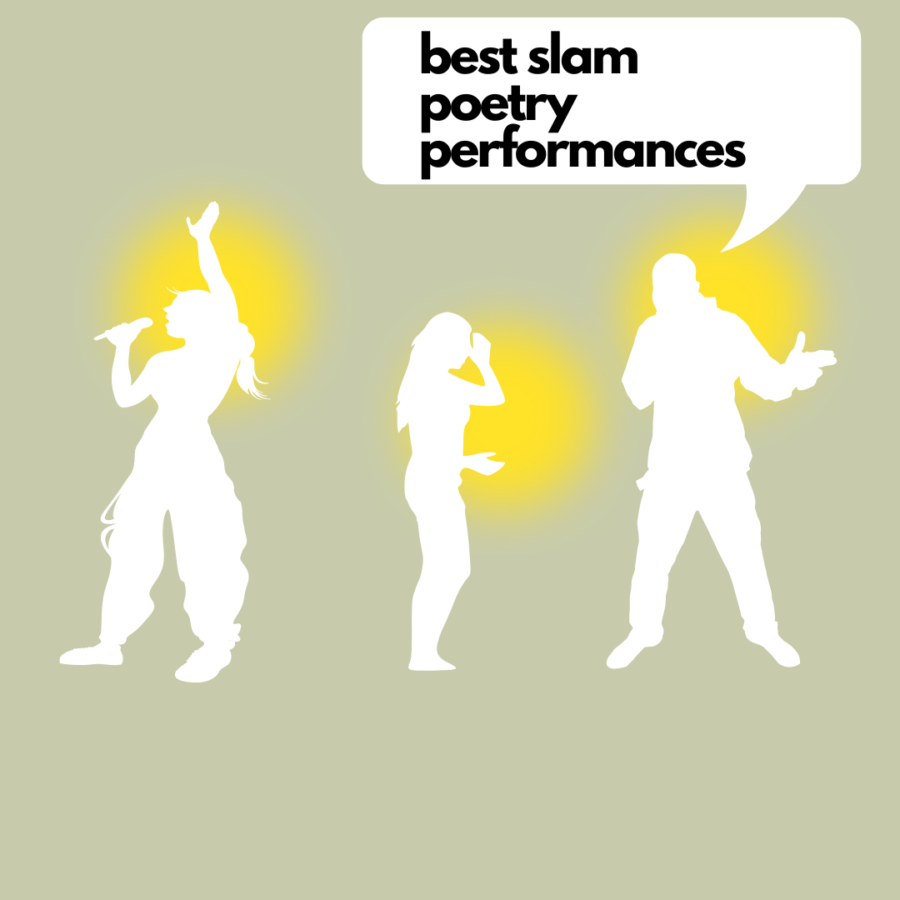My top five favorite slam poetry performances
Slam poetry (also known as spoken word) can be a misinterpreted art form. Unlike written poetry, which has been around for centuries, slam poetry is a modern rendition of poetry, stuck in a chasm between lyrical rap and poetry. There are a lot of people who do not know what slam poetry is or have never actually heard one performed.
I discovered my love for slam poetry after stumbling upon YouTube videos which showcased people as young as I was standing up for what they believe in or expressing strong, intent emotion through poetry. It was a combination of all my favorite mediums: rap because of rhythm, melody because of the flow and writing because of the lyrics. Slam poetry is truly alive, carrying soul through every syllable and sound.
Here are my favorite slam poetry pieces for National Poetry Month that range from personal anecdotes and bold activism to hard confessions of strangers I still carry with me. Hopefully they may also leave an impact on you.
National Poetry Slam Finals 2014 — “Say No” by Olivia Gatwood and Megan Falley
“Say No” is a brilliant and passionate duet poem about society’s tendency to pressure women into saying yes. Olivia Gatwood and Megal Falley take a theatrical approach to addressing this issue, listing and reenacting uncomfortable situations women go through such as catcalling, workplace discrimination and sexual pressure where saying ‘no’ is unfairly detrimental to their image or status.
Gatwood and Falley expertly build up the danger of saying ‘no’ to the end, where they tell a true story of a boy who stabbed a girl just because she rejected his prom invite. The ending left me breathless and heavily impacted. I rethought what it meant to say ’no’ and how society has made some women feel unable to say it without repercussions.
Women of the World Poetry Slam 2016 – “Hair” by Elizabeth Acevedo
Elizabeth Acevedo fights against stereotypes about minorities and love in “Hair,” where she uses her hair as a metaphor for culture. In this poem, she is disagreeing with her mother who doesn’t want her, as a Dominican woman, to be with a Black man. Acevedo describes the way society pressures girls like her to wash the color out of their skin and straighten their naturally curly hair.
Acevedo emphasizes the beauty of two oppressed people being able to love each other, protect each other and hold each other, despite scrutinization. Her deep pride for her culture and her boyfriend’s heritage certainly ignites flame in the audience, as it loudly voices its agreement. She ends with a sentiment that she’ll be proud to pass her hair onto her child and that it’s an essential part of her, something that must not be erased.
Button Poetry (live) — “Repetition” by Phil Kaye
Phil Kaye’s “Repetition” uses expert lyricism and symbolism to share his feelings on his parents’ divorce. He begins by telling the audience that as a kid he used to repeat a word so many times that word became meaningless. To prove it, Kaye repeats the word ‘separation,’ confirming that after too many times, it doesn’t sound like anything.
Unfortunately, after his parent’s divorce, Kaye developed a stutter and was forced to painfully push every word out of his mouth. He compares these words to his problems and how by repeating them, he was trying to make the divorce lose meaning; except Kaye learned through the stutter he developed that he needs to break down the pain and accept what happened to him. Only then was he able to finally move past his trauma.
In “Relapse,” Blythe Baird is able to put into words a struggle many girls and boys go through around the world. She talks about her experiences with the mental toll her eating disorder put on her and verbalizes her concerns about being a role model to young girls.
This was a relatable and real piece that put many issues into perspective, as I also have felt inadequate because of relapses even if it may not have been about eating. Sometimes, change doesn’t happen right away, and as much as you can grow, you also take a step backward. This poem really captured human nature, but still had a message of hope and comfort.
“Private Parts” by Sarah K” by Sarah Kay
“Private parts” by Sarah Kay is a wholesome and admirable description of love and the beauty of the small things. Kay is skilled at taking big feelings and ideas and compressing them into concepts the crowd will understand, such as how lovers hold hands and how sometimes first loves don’t work out. She reiterates how love doesn’t have to be passionate or sexual, but really is just the “private parts” of two people’s lives that are given and received.
Unlike a lot of poems about love, Kay doesn’t over dramatize the feeling, but simply tells the audience about how people come in and out of her life with pieces of her. She claims that even if she may know everything about someone and at a time loved them, it doesn’t mean she was meant to be with them.

Senior Juliana Mun is the opinion editor and this is her second year on staff. In her free time, she enjoys writing long stories, traveling and going out...



